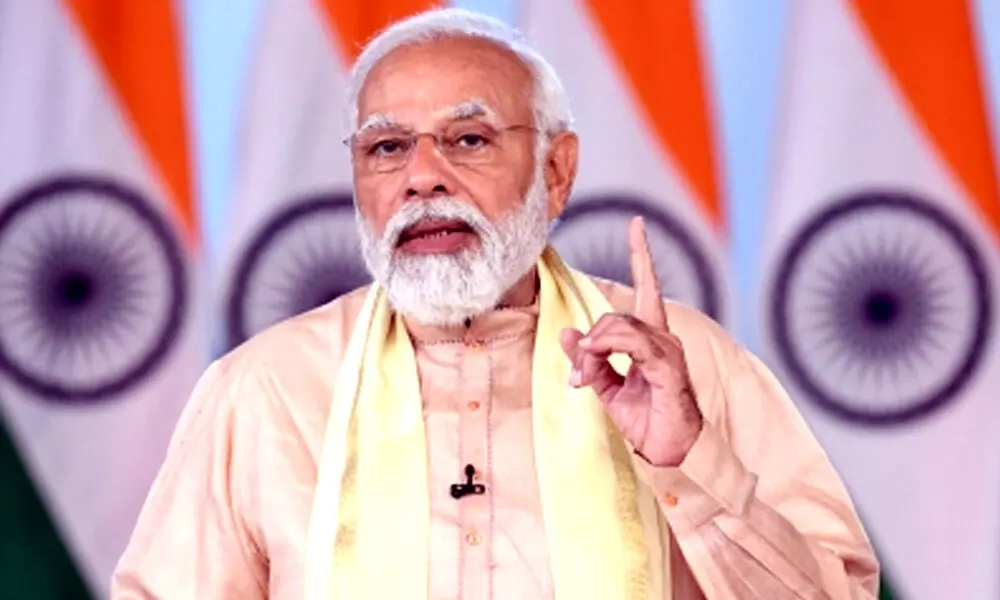Live
- Abetment of suicide: Mere harassment not sufficient to find accused guilty says SC
- 6.79L homes to receive water under Amrut-II
- Cops prohibit assembly of 5 or more near Group-II exam centres
- Avanthi, Grandhi quit YSRCP, lash out at Jagan
- Dharani portal services paused till Dec 16
- Komuravelli Mallanna Swamy Jatara from Jan 19
- Study tour for TG legislators soon
- State cabinet expansion by Dec 31: Ponguleti
- 2 Narayanites bag gold medals in IJSO-2024
- Jail superintendent suspended in ailing farmer handcuff incident
Just In
Unification of municipal bodies will restore importance of Mayor in Delhi


Prime Minister Narendra Modi (Photo/IANS)
The Union Cabinet headed by Prime Minister Narendra Modi on Tuesday approved the Unification Bill, which paves the way for the merger of Delhi's three municipal corporations -- north, south and east -- into one. The Bill is likely to be tabled in the Parliament soon.
New Delhi: The Union Cabinet headed by Prime Minister Narendra Modi on Tuesday approved the Unification Bill, which paves the way for the merger of Delhi's three municipal corporations -- north, south and east -- into one. The Bill is likely to be tabled in the Parliament soon.
The move will once again make the office of 'Mayor' an important one, like it used to be before the trifurcation of the Municipal Corporation of Delhi (MCD) in 2012, a profile that could be compared to that of the Chief Minister, sources said.
Former Councillor Subhash Ayra, who was the leader of the house in the unified MCD from 2007-12, told IANS that the decision of trifurcating the MCD by the then Sheila Dikshit government was wrong, which was an attempt to cut the stature of the Mayor.
"With the unification and the proposed 'One Mayor' for Delhi, the office will regain its lost glory and the person occupying it will once again receive the stature of 'first citizen' of the national capital. Earlier, the Mayor of Delhi used to receive foreign dignitaries at the airport as the first citizen of the city. After trifurcation, the office of Mayor lost its importance," Arya said.
Old timers said that before the trifurcation, the Mayor of Delhi was seen at par with the Chief Minister of the national capital.
"When the MCD was unified, the post of Mayor was considered as a powerful one. But after the trifurcation, it lost all its gravity and significance," said a former member of the unified corporation.
Kanwar Sain, who was the Mayor of Delhi in 2009-10, told IANS that the trifurcation of MCD was a political decision taken by the Sheila Dikshit government without any reasonable logic.
"Being the first citizen of Delhi, the Mayor used to challenge the authority of then Chief Minister Sheila Dikshit. To cut the Mayor's office down to size, the MCD was trifurcated without giving any logical reason.
"The Mayor's position was and will remain powerful with authority. Senior officials with experience will be appointed as municipal commissioners, and the expenditure will also decrease," Sain said.
Arya added that after the unification, the Mayor will have more power.
"More responsibilities which were earlier taken back from the corporation are likely to be given back to MCD after the unification," Arya said.
The unified MCD had 272 wards distributed among 12 administrative zones, with 22 departments and a single municipal commissioner.
After the trifurcation, it had three commissioners, 66 heads of departments, and three Mayors.
"Expenditure incurred in running three offices will come down, saving the taxpayers' money," Sain added.

© 2024 Hyderabad Media House Limited/The Hans India. All rights reserved. Powered by hocalwire.com






